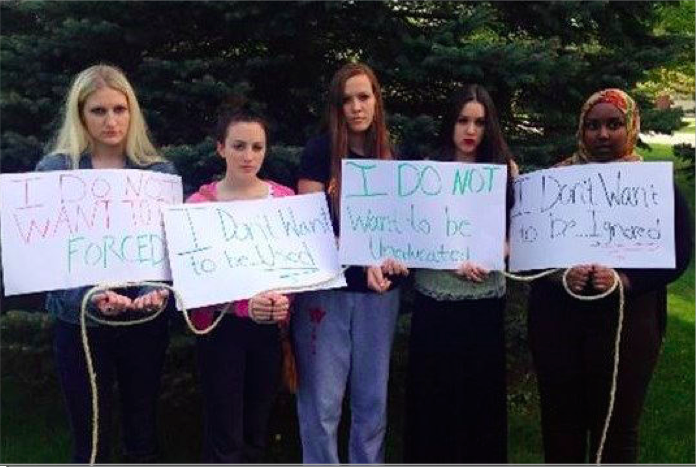On the night of April 14, 2014 and the morning of April 15, 276 female students of age 16-18 were kidnapped from the Government Secondary School by the Islamic Jihadist and Takfiri terrorist organization Boko Haram in Chibok, Nigeria. The students had come into school to take their final exam in physics after a four-week break of classes, and the militants brutally broke into the school, shooting guards and killed one of the soldiers who was there to protect them, sending the girls onto a bus to a secret location and making sure the school was completely vandalized and ruined. Even houses in the town were burned down by Boko Haram in its wrath.
The helpless girls are being sold by Boko Haram’s members, at a price equivalent to the $12.50 in USD (that’s less than the price of two Chipotle burritos). Boko Haram has brutally trafficked many students into sex slavery and household slavery prior to the incident, so it is quite plausible that these girls are being mistreated in this fashion at this very moment.
Boko Haram’s leader, Abubakar Shekau, has claimed full responsibility in the kidnappings, using his religious beliefs to justify his actions. He made it clear that he believed that girls should not be in school, as they should have been married at the age of 9 which is suitable for marriage. In a video released on May 12, Boko Haram released a video showing 130 kidnapped girls, demanding that the Nigerian government conduct a prisoner exchange for the girls by returning arrested members of the group.
What’s more, Boko Haram abducted eight more girls aged 12-15 following the incident and even killed 300 villagers in the nearby town of Gamboru Ngala when Nigerian soldiers left them to search for the young women.
The acts that Boko Haram has committed against girls our own age, in high school, are an outrage. Every child, female or male, deserves an education, and every person deserves the right to religious freedom as written in the United Nation’s Declaration of Human Rights.
When facing these sorts of hard facts, it’s difficult to fathom the atrocities committed abroad. Just imagining going to a neighboring high school, for instance Williamsville South, for an important final exam like the SAT and getting kidnapped there is just unbelievable, yet it basically just happened to girls in Nigeria.
Williamsville East High School sophomore Allie Walker, with help from Raquelle Raugh, Dr. Redmond, and Mr. Miranda, has decided not to remain silent on this pressing issue. Instead of just passing by the news story and feeling distanced from what’s going on, Walker decided to begin a movement online called I Want to Be using social media. Though Walker states that the goal for the movement is to potentially begin a nonprofit organization that encompasses several human rights issues like global hunger and child slavery, right now, she believes that the best way to help the girls who were kidnapped is by increasing awareness. In order to do so, she has started a hashtag #iwanttobe on Instagram, Twitter, and Facebook (the Instagram username is @i.want.to.be and the Twitter username is @I_Want_tobe) and is instructing people to create a sign saying “I Want to Be [insert idea or occupation here]” that gives a face to the dreams these girls have lost at the hands of Boko Haram.
A second step that Walker believes will bring action to the cause is by having teens write letters to legislators like Senator Schumer and Senator Gillibrand of New York. Writing to senators stating that their constituents believe that the kidnapping of the girls from Chibok, Nigeria is an important issue may lead them to vote for action on the floor or even bring up the issue themselves. The United States has actually deployed several soldiers to Nigeria in last week to search for the girls, so this sort of letter-writing support will be invaluable to ensure that the troops are not brought back to the US before finishing their mission.
It’s easy to get caught up in the miniscule injustices of our American education system, from class rank to Common Core, in our suburban bubble. However, we must never be complacent and turn a blind eye to the struggles our peers face around the globe.










